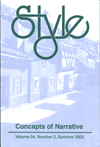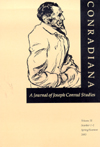Professor, Department of English
University of Maryland
College Park, MD 20742
(301) 405-3839
richb@umd.edu
Brian Richardson received his PhD from the University of Washington in 1988. Before coming to the University of Maryland, he taught at the University of Florida for four years. His primary areas of interest are narrative theory, the poetics of drama, and twentieth century literature. His current focus is on the major fiction of Conrad, Joyce, Woolf, and Beckett. He is also interested in unusual and audacious works by authors of all periods from Aristophanes and Petronius to Angela Carter and Salman Rushdie. He is the organizer and director of the Washington Area Modernist Symposium and the UM James Joyce Colloquium.
Research
Books:
Modernism, the Reader, and the Other: Dramas of Misreading (nearing completion). Chapters on misreading in Conrad, Joyce, Ford and Mansfield, Woolf, Nabokov, and Ellison.
Unnatural Voices: Extreme Narration in Modern and Contemporary Fiction (Ohio State University Press, Theory and Interpretation of Narrative series (2006) 164 pp.
Unlikely Stories: Causality and the Nature of Modern Narrative. Newark and London: University of Delaware Press (1997) 219 pp.
Books Edited:
Narrative Beginnings. Essays by Oliver Buckton, Philippe Carrard, Melba Cuddy-Keane, Marilyn Edelstein, Patrick Colm Hogan, Armine Kotin Mortimer, Gaura Narayan, James Phelan, Carlos Riobo, Catherine Romagnolo, Susan Winnett, and others, Lincoln: University of Nebraska Press (forthcoming).
Narrative Dynamics: Essays on Time, Plot, Closure, and Frames. Columbus OH: Ohio State UP, 2002. 399 pp.
Publications by Area:
- NARRATIVE THEORY
- MODERNISM
- POSTMODERNISM
- JAMES JOYCE
- JOSEPH CONRAD
- VIRGINIA WOOLF
- SAMUEL BECKETT
- DRAMA
Books:
Unlikely Stories: Causality and the Nature of Modern Narrative. University of Delaware Press (1997) 219 pp. [Chapters on causality in philosophy and literature; the canons of probability governing fictional worlds; causal connection as defining feature of narrative (with analysis of Mrs Dalloway); chance in Conrad, Faulkner, and Ellison; Beckett's assault on causality; chance, cause and fate in minority, postcolonial, and postmodern texts.] Reviewed in Style |
 |
Unnatural Voices: Extreme Narration in Modern and Postmodern Fiction. Ohio State University Press, 2006. Explores unusual narrators and extreme forms of narration in twentieth century fiction. Chapters on second person narration, “we” narration, multi-person narration, and various types of postmodern practices that cannot be placed within conventional theoretical frameworks. A final chapter offers a new model to depict the shifting relations between author, implied author, narrator, narratee, implied reader, and actual reader. |
Edited Volumes:
Narrative Dynamics: Essays on Plot, Time, Closure, and Frames. Ohio State UP, 2002. [Essential essays including Bakhtin and Genette on time, Crane, Frye, Brooks, and Nancy Miller on plot, Tomashevsky on sequence, Said on beginnings, D. A. Miller and DuPlessis on endings, and Derrida on frames].Reviewed in MODERNISM /modernity Reviewed in LWU
|
 |
 |
Guest editor, journal special issue: Concepts of Narrative, Style 34.2 (2000). [Essays on poststructuralist narrative theory, narratology and the body, homosexual narrative, problems in feminist narrative theory, lingusitic and cognitive approaches to narrative, narrative history, reflexivity, and unreliability.] |
| Guest Editor, journal special issue: Conrad and the Reader, Conradiana 35.1(2003). [Essays on theoretical constructs and historical reception]. |  |
Selected Articles:
- “A Theory of Narrative Beginnings and the Beginnings of ‘The Dead’ and Molloy,” in Narrative Beginnings, 2008. 28 ms pp. [Explores narrative beginnings in a narrative’s fabula, sujet, and antetext, and seeks the elusive beginning of “The Dead” and notes the many odd beginnings of Molloy.]
- “Plot after Postmodernism,” Drama and/after Postmodernism. Contemporary Drama in English, vol. 14, ed. Martin Middeke. Trier: WVT, 2007. [Examines elusive, disjunctive, and “impossible” plots in Beckett, Pinter, Churchill, Crimp, and Handke.]
- “Teaching Plot,” Approaches to Teaching Narrative Theory, eds. David Herman, Brian McHale, and James Phelan, MLA (forthcoming, 2007). [Outlines basic approaches to plot; uses examples from Dubliners.]
- “Sex, Silver, Naming, and Biblical Allegory: Thematic and Intertextual Resolutions at the End of Nostromo,” Conradiana, special issue, A Hundred Years of Nostromo (forthcoming, 2007). [Sets forth the various kinds of closure at the end of Nostromo.]
- “Narrative and Drama,” Cambridge Companion to Narrative Theory, ed. David Herman, Cambridge UP, 2007 (in press). [Outlines the basic categories of narrative poetics and applies them to Beckett’s Endgame.]
- "Ulysses and the Value of Literary Value: Verbal Art and Colonial Resistance" James Joyce Quarterly 42.1-2 (2006) [Discusses the role of verbal art as anti-colonial element throughout Ulysses, assesses disciplinary rivalries and scatological references from this perspective.]
- “Bad Joyce: Anti-Aesthetic Practices in Ulysses,” Hypermedia Joyce Studies 7.1 2005-6 (posted March 2006). 18 paragraphs, 4,400 words. http://www.geocities.com/hypermedia_joyce/ [Examines the unusual cases of deliberately “bad” writing in Ulysses.]
- “Making Time: Narrative Temporality in Twentieth Century Literature and Theory,” Literature Compass [online: http://www.literature-compass.com posted March 2006. [Outlines the varied practices of constructing temporality in modern fiction and the work of several recent theorists].
- “Beyond the Poetics of Plot: The Varieties of Narrative Progression and the Multiple Trajectories of Ulysses,”A Companion to Narrative Theory, eds. James Phelan and Peter Rabinowitz, Blackwell: 2005, 167-80. [Outlines the many ways of ordering narrative progression other than plot; discusses these strategies as they appear in Ulysses.]
- Conrad and Posthumanist Narration: Fabricating Class and Consciousness onboard the ‘Narcissus,’” Conrad in the Twenty-First Century, eds. Carola Kaplan, Peter Mallios, and Andrea White. Routledge: 2005, 213-22. [Discusses Conrad’s representations of class and the technique of “we-narration” as well as later, postcolonial uses of the “we” form.]
- “Beyond Story and Discourse: Narrative Time in Postmodern and Nonmimetic Fiction,” Narrative Dynamics: Essays on Time, Plot, Closure, and Frames 47-63. [theorizes and delineates six types of impossible chronological sequences common in postmodern fiction]
- "Construing Conrad's The Secret Sharer: Suppressed Narratives, Subaltern Reception, and the Act of Interpretation," Studies in the Novel, (2001)306-21. [Argues for an extremely unreliable narrator based on the largely suppressed accounts and responses of the seamen; notes historical contexts of suspicious captains and relevant literary use of the double]
- "Voice and Narration in Postmodern Drama," New Literary History 32 (2001) 681-94. [Narrators in Stoppard, Beckett, Vogel and Others.]
- "Denarration in Fiction: Erasing the Story in Beckett and Others," Narrative 9 (2001) 168-75. [Explores theoretical status of texts by Beckett and others in which events are narrated, then negated.]
- "Make It Old: Lucian's A True Story, Joyce's Ulysses, and Homeric Patterns in Ancient Fiction," Comparative Literature Studies 37 (2000) 371-84. [Discusses Lucian's 2nd Century text as possible prototype of Ulysses; notes prose rewritings of Homer elsewhere in ancient fiction; intervenes in debates on the origins of the novel.]
- "Linearity and Its Discontents: Rethinking Narrative Form and Ideological Valence," College English 62 (2000) 685-95. [Critically examines claims of the putative ideological nature of narative stratagies like linearity, voice, and closure; charts a history of feminist deployments of pure linearity.]
- "The Genealogies of Ulysses, the Invention of Postmodernism, and the Narratives of Literary History," ELH 67 (2000) 1035-54. [Critically examines the various narratives of the history of modern literature Ulysses has been placed within. Assesses the case for a postmodern Ulysses.]
- "Conventional Poetics and Postmodern Transgression: Theorizing the Collapse of Time, Voice, and Frame." Narrative 8 (2000) 23-42. [Discusses Jeanette Winterson, also Beckett, Woolf, Aichinger, Robbe-Grillet, A. Carter, and others.]
- "Theatrical Space and the Domain of Endgame" The Journal of Dramatic Theory and Criticism 15 (2000) 14-22. [Explores the significance of ontological issues in Endgame and elsewhere in modern drama.]
- "Re-Mapping the Present: The Master Narrative of Modern Literary History and the Lost Forms of Twentieth-Century Fiction," Twentieth Century Literature 43 (1997) 291-309. [Draws attention to "lost" forms such as neo-modernism, feminist realism, expressionism, and the current revival of the romance; notes problems with most narrative accounts of literary history.]
- "Beyond Poststructuralism: Theory of Character, the Personae of Modern Drama, and the Antinomies of Critical Theory," Modern Drama 40 (1997) 86-99. [Argues that a comprhensive theory of character must draw from critical positions usually set forth as mutually exclusive.]
- "The Other Reader's Response: On Multiple, Divided, and Oppositional Audiences," Criticism 38 (1997) 31-53. [Analyzes the opposed audiences inscribed within several `minority' and some modernist texts. Discusses Lolita and fiction by Achebe, Grace Paley, Michelle Cliff, and others]
- "Genre, Transgression, and the Struggle for (Self) Representation in U.S. Ethnic Drama," The Journal of American Drama and Theatre 9 (1996) 1-18.
- "The Struggle for the Real: Interpretive Conflict, Dramatic Method, and the Paradox of Realism," introductory essay in Realism and the American Dramatic Tradition, ed. William Demastes; Tuscaloosa: U of Alabama Press (1996) 1-17.
- "White on Black: Iconography, Race, and Reflexivity in Ellison's Invisible Man," Southern Humanities Review 30 (1996) 139-50. [Examines black and white as racial, ideological, and compositional elements; includes accounts of the varieties of reflexivity in Ellison and others.]
- "I, etcetera: On the Poetics and Ideology of Multi-personed Narratives." Style 28 (1994) 312-28. [Discusses unusual, multiple, deceptive, and impossible types of narration]
- "Causality in Molloy: Philosophic Theme, Narrative Transgression, and Metafictional Paradox," Style 26 (1992) 66-78. [Includes analysis of five types of reflexivity]
- "The Poetics and Politics of Second Person Narrative," Genre 24 (1991) 309-330. [Inculdes brief discussions of texts by Calvino, Edna O'Brien, Lorrie Moore, and others]
- "Pinter's Landscape and the Boundaries of Narrative," Essays in Literature18 (1991) 37-45.
- "`Hours Dreadful and Things Strange': Inversions of Chronology and Causality in Macbeth," Philological Quarterly 68 (1989) 283-94.
- "Point of View in Drama: Diegetic Monologue, Unreliable Narrators, and the Author's Voice on Stage," Comparative Drama 22 (1988) 193-214.
- "`Time is Out of Joint': Narrative Models and the Temporality of the Drama," Poetics Today 8 (1987) 299-309.
- Review of Conrad in Europe, ed. Marcin Piechota. Conradiana (forthcoming).
- Review of Narrative Causalities by Emma Kafalenos, Style (forthcoming).
- “Anti-Narrative,” “Causality,” “Denarration,” and “Narrative Dynamics” entries in The Encyclopedia of Narrative Theory, Routledge (2005).
- “Is That Really Einstein? The Ontological Status of Historical Characters in Drama,” STAR Conference Proceedings (Digital Video), 2005: Http://online.kitp.ucsb.edu/online/STAR_c05/panel 3 _
- “Native American Drama,” Facts on File Companion to American Drama, eds. Jackson R. Bryer and Mary Hartig; New York (2004) 340-41.
- Review of Conrad, Language, and Narrative, by Michael Greaney. Studies in the Novel, forthcoming.
- Review of The Distinction of Fiction, by Dorrit Cohn. Novel 32 (1999)
- Performance Review: Washington D.C. Beckett Festival, March-May, 1999. The Beckett Circle, Fall 1999.
- "A Postclassical Narratology," PMLA 113 (1998) 288-89.
- Review of Narrative/Theory, ed. David Richter. South Atlantic Review (1998).
- Performance Review: Old Times, Washington Stage Guild, November 20, 1994. The Pinter Review 1995-96, 184-85.
- Review of Standard Deviations: Chance and the Modern British Novel, by Leland Monk. Modern Fiction Studies 40 (1994) 397-99.
- Performance Review: The Caretaker, Studio Theatre (Washington D.C.), September 12, 1993. The Pinter Review 1994, 109-110.
- Review of Ariadne's Thread: Story Lines, by J. Hillis Miller. Studies in the Novel 25 (1993) 493-95.
Books in Preparation:
- The Narrative of Ulysses
Courses
6047 -- Western, Asian, and Minority Drama.
ENGL 668 -- Readings in Modern Literary Theory -- Narrative Theory and Current Critical Debates.
ENGL 499 -- Modern Rewritings of Marlowe and Shakespeare.
ENGL 399 -- Experimental British Literature.
ENGL 749 -- Ulysses and Contemporary Criticism.
ENGL 630 -- Readings in 20th Century British Litrature.
Literary Guide to Modern Painting at the National Gallery of Art